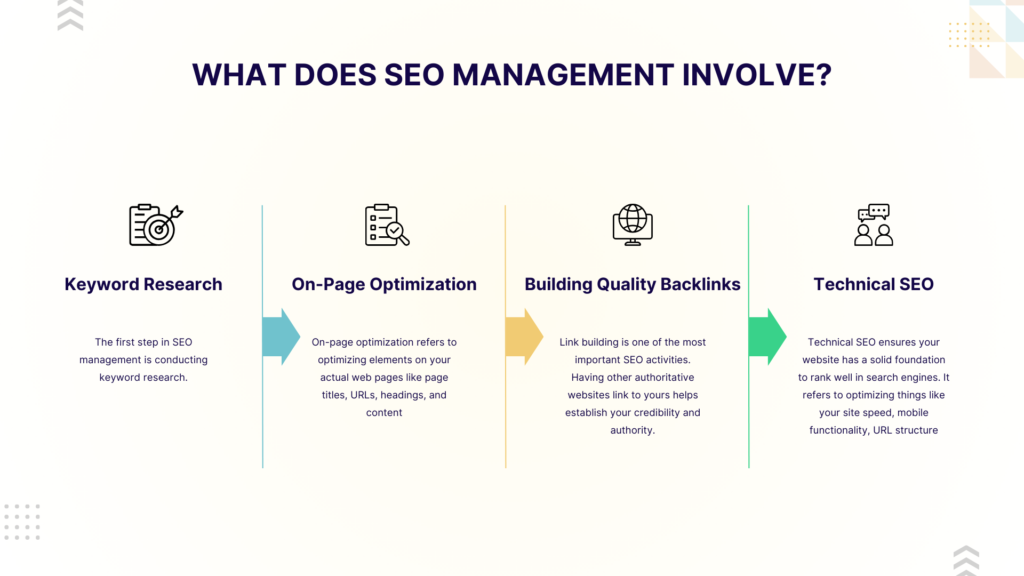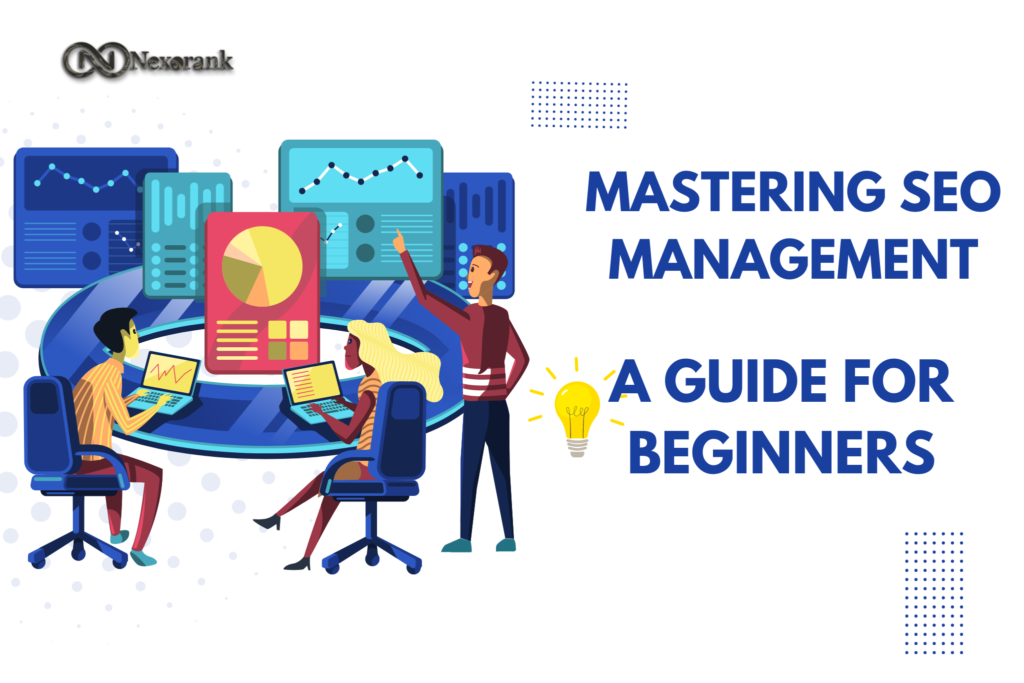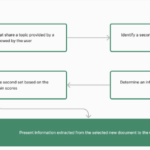You’ve probably heard the term “SEO” thrown around, but do you really know what it means or how to make it work for you? Get ready to become an SEO master with this comprehensive guide. First, we’ll demystify the key concepts of search engine optimization. You’ll learn insider tips and strategies to amp up your website’s visibility and help it stand out in the increasingly competitive SERPs. Whether you’re running a small business website or just getting into blogging, optimizing for search engines is crucial for reaching people online. Our step-by-step instructions will take you from SEO novice to pro. You’ll be implementing keyword research, on-page optimization, content building blocks, link earning techniques, and analytics tracking in no time. With some dedicated effort on your part, your site will be well on its way to dominating those critical first-page rankings!
What Is SEO Management?
SEO management refers to the process of improving your website’s ranking in search engines like Google. As an SEO manager, you’ll be in charge of implementing strategies to increase traffic from search engines, boost conversions, and enhance your online presence.
Keyword Research
The first step is researching the keywords your target audience is searching for. You’ll analyze tools like Google Search Console and SEMrush to find keywords with high search volume and low difficulty. Choose 10-15 primary keywords to focus your optimization efforts around.
On-Page Optimization
Next, you’ll optimize your website content for those keywords. Include your primary keywords in page titles, URLs, headings, and content. Make sure your pages are mobile-friendly and load quickly. The goal is to make it easy for search engines to crawl, index, and rank your content.
Building Quality Backlinks
Link building involves earning high-quality backlinks from other authoritative websites. These incoming links signal to Google that your site is a trusted authority on your topics. Aim for relevant links from websites with a high domain authority. Guest blogging, broken link building, and resource link pages are some of the best ways to build links.
Tracking and Monitoring
The final step is tracking your SEO performance to see what’s working and make improvements. Monitor metrics like rankings, traffic, and conversions in tools like Google Analytics and Search Console. See how your pages rank for target keywords and which blog posts are driving the most traffic. Make changes to boost your rankings and traffic over time.
SEO management requires ongoing effort and monitoring. But by researching keywords, optimizing your content, building links, and tracking your performance, you’ll improve your search rankings, increase organic traffic, and strengthen your online presence. With regular management, your website can achieve top rankings and become an authority in your industry.
What Does SEO Management Involve?

Keyword Research
The first step in SEO management is conducting keyword research. This helps you determine which keywords and phrases potential customers are searching for so you can optimize your content around them. You’ll want to find keywords that are relevant to your business, have a high search volume, and low competition.
On-Page Optimization
On-page optimization refers to optimizing elements on your actual web pages like page titles, URLs, headings, and content. You’ll want to include your target keywords in page titles, URLs, and headings. Use them naturally in your content as well, but don’t overdo it. The content on your pages should be informative and helpful for users. Keep your pages mobile-friendly and make sure they load quickly.
Building Quality Backlinks
Link building is one of the most important SEO activities. Having other authoritative websites link to yours helps establish your credibility and authority. Focus on building high-quality backlinks from relevant industry websites and blogs. Guest blogging, creating resources for other sites to link to, and exchanging links with partners are all great ways to build links.
Technical SEO
Technical SEO ensures your website has a solid foundation to rank well in search engines. It refers to optimizing things like your site speed, mobile functionality, URL structure, internal linking, and more. Fast loading websites tend to rank higher, so optimize images and videos and remove any broken links or redirects. Ensure your site is mobile-friendly and has a clean URL structure. Internal links should connect relevant content across your site.
Tracking and Monitoring Performance
The final step is tracking how all of your SEO efforts are impacting your site’s search performance. Monitor things like your rankings for target keywords, organic traffic, and click-through rate from search engines. See which optimization strategies are working well and which need improvement. Make changes as needed to continue improving your SEO and search rankings over time.
SEO management does require ongoing effort and monitoring. But by focusing on these key areas, you’ll establish a solid foundation for optimizing your site and improving your search rankings. Stay up-to-date with best practices and keep tweaking and improving your SEO strategy over time.
Do I Need SEO Management Services?
If you run a business, having an online presence is crucial these days. But just setting up a website isn’t enough. You need to make sure potential customers can actually find your site. This is where SEO management comes in. As a business owner, you have two options: handle SEO yourself or hire an SEO agency to help.
Doing It Yourself
If you’re technically inclined and want to save money, managing your own SEO may be appealing. However, it does require a significant time commitment to do it right. You’ll need to research keywords, optimize content, build internal links, generate backlinks, and track your rankings and traffic. For small businesses with limited resources, DIY SEO may not be realistic.
Hiring an Agency
SEO agencies have experienced teams that can focus solely on optimizing your website. They stay up-to-date with the latest algorithms and best practices. With an SEO agency, you can expect:
- Keyword research and targeting: They’ll find the best keywords and phrases to focus on to drive traffic to your site.
- On-page optimization: They’ll optimize your page titles, content, image alt text, and internal site architecture to improve rankings.
- Link building: They’ll build high-quality backlinks from authoritative sites to establish your domain as a trusted resource.
- Technical SEO: They’ll ensure your site has proper page load speeds, mobile-friendliness, schema markup, and more.
- Ranking and traffic reports: They’ll monitor your rankings and traffic regularly and make recommendations to continue improving.
- Latest SEO strategies: They stay up-to-date with Google algorithm changes and new best practices to keep your site optimized.
While the initial investment may be higher, an SEO agency can help you get real results and a higher return on investment in the long run. The question comes down to how much time and resources you have, and how quickly you want to dominate the search results. For most businesses, hiring pros is the smartest choice for long-term success.
How to Successfully Manage an SEO Campaign
Focus on keywords and keyword research.
Keywords are the words and phrases that people type into search engines to find your website. Conducting thorough keyword research will uncover the terms your target audience is using. Analyze search volumes and competitiveness to find keywords with high traffic and low difficulty. Optimize your page content, page titles, URLs, image alt text, and internal links around these keywords.
Optimize your on-page SEO.
On-page SEO refers to optimizing elements on your actual web pages. Start with your page titles, URLs, and headers. Include your target keywords, but write for humans – your titles and headers should be compelling. Use your keywords in the page content, but don’t overdo it – aim for a 2-3% keyword density. Include keywords in your image alt text and internal link anchor text. Ensure fast page load times with clean code and responsive design.
Build high-quality backlinks.
Backlinks are links from other websites pointing back to your site. Focus on earning backlinks from authoritative, trusted sites. Guest blogging, expert roundups, and influencer outreach are great ways to build quality backlinks. Avoid buying links or posting spam comments, as these can hurt your rankings.
Track and analyze your results.
Use tools like Google Analytics, Google Search Console, and rank tracking software to monitor how your SEO efforts are impacting traffic and rankings. See which keywords are driving the most traffic, where your backlinks are coming from, how your pages rank for target keywords, and more. Check your rankings and traffic regularly and make changes to your strategy as needed to keep improving your SEO performance over time.
SEO management does require ongoing effort, but by focusing on these key areas, optimizing for users, and tracking your results, you’ll be well on your way to higher rankings, more traffic, and a stronger online presence. Keep learning and adapting your skills, and your website will reap the benefits through better search visibility and more organic traffic.
On-Page vs. Off-Page vs. Technical SEO Management
On-Page SEO
On-page SEO refers to optimizing individual web pages to rank higher in search engines. This includes optimizing page titles, URLs, headings, content, image alt text, and internal links. Make sure your page titles and headings contain important keywords, and that content is helpful, original, and includes those keywords. Use shorter URLs that contain keywords, and link to other relevant content on your site. On-page SEO establishes the foundation for good SEO.
Off-Page SEO
Off-page SEO involves building high-quality inbound links to your website from external websites. Link building helps search engines discover your content and signals to them that your site is authoritative. Reach out to other sites and ask them to link to your helpful content. You can also build links by creating resources that other sites will want to link to, like blog posts, studies, or tools. Diversify the sites that link to you, and avoid low-quality links from irrelevant sites.
Technical SEO
Technical SEO ensures that search engines can easily crawl and index your website. It includes optimizing page speed, fixing broken links, creating a mobile-friendly responsive design, and submitting an XML sitemap to help search engines discover all your pages. Technical SEO also involves optimizing your site architecture by using descriptive page titles and a simple, logical URL structure with keywords.
Keeping on top of on-page optimization, building high-quality backlinks, and maintaining good technical SEO are all important parts of effective SEO management. Focusing on one area alone won’t lead to the best results. Use on-page SEO to create great content, then promote that content with off-page SEO to build authority and rankings. And technical SEO ensures that search engines can properly access and index your amazing content and backlinks in the first place! With regular management of all three areas, your SEO will be in great shape.
SEO Management: 7 Steps to Skyrocket Your Traffic
To master SEO management and send your website traffic soaring, follow these seven essential steps:
1. Keyword Research
The foundation of any SEO strategy is keyword research. Find relevant keywords and phrases that your target audience is searching for. Aim for long-tail keywords that are specific to your content and have decent search volume. Use free tools like Google’s Keyword Planner to uncover keyword opportunities.
2. Optimize Your Pages
With your list of target keywords in hand, optimize your website pages around them. Place your primary keyword in the page title, URL, headings, and content. Use your keyword 3-5 times in the first 100 words, spacing them out. Make sure your page content is comprehensive, high quality, and includes related terms.
3. Build Internal Links
Link to other relevant content on your site. Internal links pass authority from one page to another, helping search engines discover your content. They also enhance the user experience by leading visitors to related information.
4. Earn High-Quality Backlinks
Build links from authoritative websites to establish your site as a trusted resource. Focus on earning backlinks from industry influencers and high-traffic sites. Guest blogging, broken link building, and resource page outreach are effective ways to gain high-quality backlinks.
5. Improve Site Speed
A fast loading website leads to higher rankings, lower bounce rates, and increased conversions. Optimize your images, enable compression, and minify CSS and JavaScript to improve page speed. Aim for a page load time under 2 seconds.
6. Track Your Rankings and Traffic
Use tools like Google Search Console, Google Analytics, and SEMrush to monitor how your optimization efforts impact rankings and traffic. See which keywords and pages are ranking well and make changes to underperforming content. Tracking data will inform your SEO strategy and help focus your efforts.
7. Continually Improve
SEO management is an ongoing process. Continue to create and optimize content, build links, improve site speed, and track your performance. Stay up-to-date with search engine algorithm changes and update your strategy accordingly. Consistently refining and improving your SEO will keep your website ahead of the competition.
With time and practice, you’ll be optimizing like a pro and enjoying the rewards of increased organic traffic and higher search rankings. Master these steps and you’ll be well on your way to SEO success!
Tools and Resources for SEO Management
When managing SEO, there are several tools and resources you’ll want to utilize. Some are free, while others require a paid subscription. Depending on your needs and budget, you can choose the options that work best for your organization.
For keyword research, free tools like Google’s Keyword Planner, Moz’s Keyword Explorer, and Ubersuggest can help generate keyword ideas and check search volume. Paid tools like Ahrefs, SEMrush, and SpyFu offer more in-depth research and analysis.
To audit your on-page optimization and technical SEO, use a tool like Moz Pro, Ahrefs, or Screaming Frog. They’ll analyze things like page titles, meta descriptions, header tags, site speed, mobile-friendliness, and more. They provide actionable insights to improve your rankings.
For link building, look to tools like Ahrefs, Moz Pro, and BuzzStream. They help discover link building opportunities, track your link profile, and streamline the outreach process. Some offer automated link building options as well using artificial intelligence.
In terms of performance tracking, you have many options like Google Analytics, Google Search Console, Moz Pro, and SimilarWeb. They allow you to monitor metrics such as organic traffic, rankings, click-through rates, and keyword positions to see how your SEO efforts are impacting results over time.
Staying on top of SEO trends and best practices is also important. Follow reputable sources like Moz, Search Engine Journal, Search Engine Roundtable and others. They frequently publish educational content on the latest SEO strategies, tips, and news.
With the right tools and resources in place, you’ll be well on your way to managing a successful SEO program. Be sure to evaluate different options to find what works within your budget and needs. And keep learning—SEO is an ever-changing field, so continuous reading and expanding your knowledge is key.
Common Challenges and Solutions in SEO Management
SEO management comes with its fair share of obstacles, but the good news is there are ways to overcome them. One common challenge is lacking a well-defined SEO strategy. Without clear goals and priorities, your efforts can feel scattered and ineffective. The solution is creating an SEO strategy that aligns with your business objectives and target audience. Identify key performance indicators to track progress and revisit your strategy regularly.
Another hurdle is difficulty getting buy-in from leadership. Some executives don’t fully understand the value of SEO or why it should be a priority. You’ll need to make a strong business case by educating them on the benefits, like increased traffic, higher rankings, and improved brand visibility. Share reports, metrics, and success stories to demonstrate the impact SEO can have. With facts and data to support your argument, gaining approval and budget should become easier.
Limited resources and bandwidth are also common challenges. There may be too few team members to carry out all the required SEO tasks. Outsourcing certain activities to an agency or freelancers can help fill in gaps. Focus your in-house efforts on high-priority areas like content creation or link building.
Technical issues with a website can pose problems too. Things like slow page load times, duplicate content, and broken links hurt SEO performance and user experience. Perform regular site audits to detect and fix technical problems. Improve page load speeds, remove duplicate content, and redirect or delete broken links. Even small tweaks can significantly boost your rankings and traffic.
With the right strategies and solutions in place, you can navigate the challenges of SEO management and achieve your goals. Define your priorities, make a strong case for resources, outsource when needed, fix any technical issues, and keep optimizing your efforts over time. Success will come as you gain experience and see the impact of your hard work in the SERPs.
Seo Management FAQ
Once you dive into SEO management, you’re bound to have some questions. Here are some of the most common FAQs to help get you started.
Keyword research involves identifying the words and phrases your target audience uses to search for your products or services. You’ll want to find keywords that have high search volume but low competition. Some tools for keyword research include Google Search Console, SEMrush, and Moz Keyword Explorer.
On-page SEO refers to optimizing elements on your actual web pages, like page titles, meta descriptions, header tags, and content. You should optimize your on-page SEO continuously and consistently. Make it a habit to review and improve your on-page SEO at least once a month or if you make any major changes to your content or web pages.
Link building refers to acquiring high-quality inbound links from other authoritative websites. These links pass “link juice” to your site, which helps search engines determine your authority and rank. Link building is important because the number and quality of inbound links are a major factor in search engine rankings.
There are several tools you can use to monitor your SEO performance and rankings. Google Search Console and Bing Webmaster Tools provide data on your search traffic, keywords, and rankings. Rank tracking tools like SEMrush, Ahrefs, and Moz monitor your rankings across search engines. Analytics tools like Google Analytics give you insight into traffic sources, pageviews, bounce rates, and other metrics.
Reviewing these FAQs should give you a good sense of what’s involved in SEO management and help you feel more confident getting started. Let me know if you have any other questions!
Conclusion
You’ve just scratched the surface of SEO management – there’s a lot more to learn. But now you know the basics and can start applying some best practices to your site. Focus first on quality content and technical optimizations. As you build authority and rankings improve organically, then layer in link building. Measure what matters along the way – traffic, leads and sales – to prove the ROI of your SEO efforts. Stay patient, keep learning, and continue refining your strategy. With the fundamental knowledge you have, you’re set up for SEO success.



















